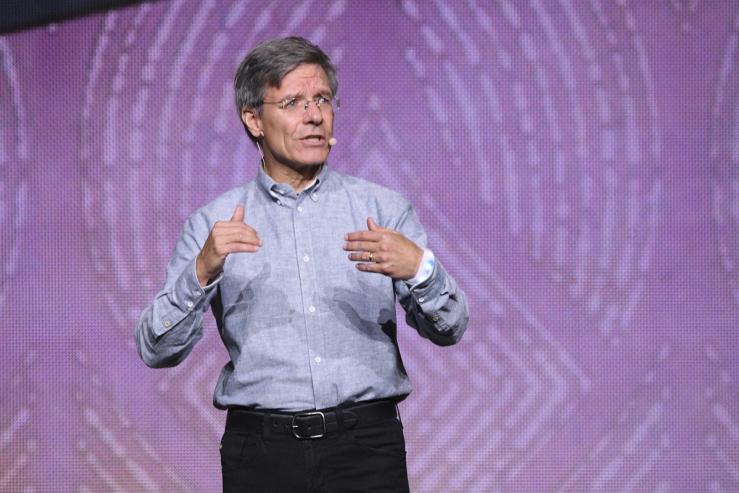The Signal Interview
In January, after a terrorist attack in New Orleans, Allstate CEO Tom Wilson recorded a short video timed to the Sugar Bowl college football game, which the city was hosting and his $50 billion insurance company was sponsoring. In earnest tones, he offered prayers for the victims before calling on Americans to be “stronger together by overcoming an addiction to divisiveness and negativity.”
The message landed with a thud among prominent conservatives on social media. Political activist Charlie Kirk accused Wilson of “lecturing” Americans, while Sean Davis, co-founder of conservative magazine The Federalist, told Wilson’s customers it was “time to cancel” Allstate. Elon Musk, owner of X, asked, “wtf is wrong with this guy?”
Wilson is undeterred. This week, Allstate released a report warning that Americans’ trust in each other is “at a tipping point,” with suspicion, isolation, and social fragmentation reaching levels that threaten the foundation of a strong democracy and a thriving economy. Its recommendations for reversing that trend involve “small behaviors” to connect people to their communities — volunteering at local schools, supporting community groups, and helping to clean up nearby parks.
Wilson sees cause for optimism in the report’s finding that people trust their neighbors more than they do the average American, and will show up to help them in times of need. “It shows there’s a really great base for America to build on,” he says: “If I’m doing sandbags with you, or I’m walking through the Palisades fire… we’re not going to be arguing about whether there should be tariffs or not.”
A social contract
If the report’s remedies sound a little motherhood-and-apple-pie, Wilson says, “Well, they are motherhood-and-apple-pie. It’s what’s made America great. We’re the United States of America. Focus on the ‘United.’”
Allstate, which has pledged $7 million to an Aspen Institute initiative on rebuilding trust in an era of polarization, is not alone in seeing the subject as a business issue. “In an economy, trust can be seen as a kind of lubricant that can dramatically reduce transaction costs for businesses,” Francis Fukuyama, the political scientist, wrote in a recent Starling Trust report on culture and conduct in the financial sector.
Wilson summons a pantheon of philosophers — Jean-Jacques Rousseau, John Locke, and David Hume — to support his argument that trust matters to society. His explanation of why trust matters to Allstate has less lofty roots.
“We have four objectives. One, serve our customers. Two, make money for our shareholders. Three, create opportunity for our team. And four, improve our communities. I think we have a license to operate as a business, [but] unless we do those four things, we won’t have the license that we currently have,” he says. Losing that license would not put Allstate out of business, he says, but it would invite more regulation.
Wilson jokes that anyone wanting to be left in peace on a flight should tell the person in the neighboring seat that they sell insurance. His profession may be a conversation-killer, but he says his campaign has not been motivated by any lack of public faith in Allstate’s brand. What Allstate sells to millions of drivers and homeowners is trust, he says. “You give us your money, and then you trust that, when something happens, we’ll be there for you.” The more people trust his company, he adds, “the longer they’ll stay with us.”
Purveyors of negativity
As the public backlash against companies that try to be agents of change has grown, many CEOs have backed away from making pronouncements on public issues. Wilson says his approach has not changed since he became Allstate’s CEO in 2007: “We’re not trying to do anything different because different people have different views or have louder megaphones,” he says: “You just stick to your principles and your values.”
Despite the social media bitterness that greeted his Sugar Bowl video, Wilson insists that he did not misread the public mood.
Just “12 accounts on X” objected to his statement that Americans were getting hooked on negativity, he explains. “These are the purveyors of negativity, so it’s not a surprise that they would not be happy... But a message of praying for victims and hope for the future — how can that be bad?”
Calls for customers to pull their business from Allstate had “zero” impact on the company, he adds; its first quarter revenues jumped 7.8% from the prior year. On the other side of the ledger from his dozen social media haters, meanwhile, 60 million people saw Allstate’s Sugar Bowl ad, and Wilson reports “a tremendous amount” of positive feedback. It is tempting for CEOs to stick to safer subjects approved by their “spin doctors,” he says, but “you’ve got to say what you believe.”
He decided “not to get negative” about his online attackers, he adds. “I got through it and I concluded, no, they’re wrong.”
Facing the firestorm
In 2019, after raising Allstate’s minimum wage, Wilson called on his fellow business leaders to “save capitalism” by paying people more. “Businesses have an obligation to play a broader role in society than just making money,” he says, and in this campaign, too, he is looking to enlist more CEOs.
Wilson is framing trust as “the oxygen of democracy” at a moment when many of his peers are steering clear of discussing anything that a polarized country could see as political. But he says corporate America “needs to speak up more” about what ails America, and he believes there is public support for CEOs that do. “Currently, people seem less willing to speak out, because you have the ability of five to 10 people to create what appears to be a firestorm.” He emphasizes: “Appears to be a firestorm.”
His riposte to executives who would rather stay out of America’s biggest debates is that “these are hard jobs to get, they are hard jobs to keep, but they are also jobs that come with huge responsibility. And the only way you keep them is you’ve got to stay true to your beliefs and just do a good job for the four groups [of stakeholders] that count. You do that and you’ll be fine.”
Wilson does not want to be like Chicken Little, predicting that the sky is about to fall, he stresses. “We’re not in a great place in America,” he says, “but we’ve got all the resources.” Americans over the course of history “go right to the edge on just about everything, [then] we call in the cavalry,” he says. “We have the resources, the talent, the money, the freedom, whatever, and we fix it. And I’m like, OK, we’ve got all these great things. Let’s just fix it. Let’s just fix it and move on.”
Notable
- In 2019, Wilson urged his fellow CEOs to “create more high-paying jobs and restore faith in capitalism.” Allstate’s median employee made $61,860 that year. Last year, that number was $73,333.
- Allstate is using artificial intelligence to craft some messages to customers, after concluding that AI-generated communications are more empathetic and less prone to use jargon.


